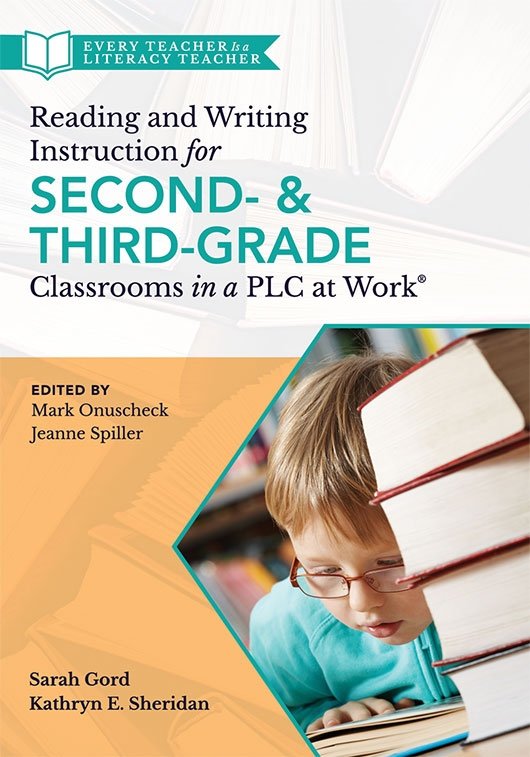Free Reproducibles
Reading and Writing Instruction for Second- and Third-Grade Classrooms in a PLC at Work®
Discover how to design standards-aligned instruction, assessment, and intervention that support the literacy development of every second- and third-grader. This resource contains best practices for collaborative teams looking to improve their students’ reading comprehension.
Benefits
- Understand the role professional learning communities (PLCs) play in literacy development.
- Learn how teams of teachers can maximize their collective strengths to make profound impacts on student literacy and reading comprehension.
- Obtain instructional strategies and tools, such as the pre-unit protocol (PREP), for unpacking and clarifying literacy standards.
- Observe how to collaboratively score quality assessments as a team and conduct effective data inquiry and analysis.
- Study the powerful impact literacy has on student engagement and inclusivity in grades two and three.
Table of Contents
Introduction: Every Teacher Is a Literacy Teacher
Chapter 1: Establish Clarity About Student Learning Expectations
Chapter 2: Examine Assessment Options for Literacy
Chapter 3: Create a Learning Progression to Guide Instruction and Assessment
Chapter 4: Develop Collective Understanding of Learning Expectations
Chapter 5: Respond to Data to Ensure All Students Learn
Chapter 6: Design Lessons Using the Gradual Release of Responsibility Instructional Framework
Chapter 7: Plan High-Quality Literacy Instruction
Chapter 8: Select Appropriate Instructional Strategies
Chapter 9: Consider Equity in Literacy
Epilogue
Appendix A: PREP Template and Other Tools
Appendix B: Process for Prioritizing Standards
Appendix C: Depth of Knowledge Overview
Appendix D: Essential Understandings and Guiding Questions
Appendix E: List of Figures and Tables
PRINTABLE REPRODUCIBLES
Chapter 2
Chapter 4
Chapter 5
- Figure 5.1: Data-Inquiry Meeting Preparation Checklist
- Figure 5.3: Tool for Creating Data-Discussion Norms
- Figure 5.4: Data-Inquiry Discussion and Recording Template
Chapter 7
- Figure 7.1: Questions to Guide Collaborative Literacy Planning
- Figure 7.2: Components of a Literacy Block
Chapter 8
- Figure 8.2: An Annotation Task
- Figure 8.4: Graphic Organizer for Explaining How Details Convey a Central Message
Appendix A
- PREP Template
- Protocol to Unwrap Priority Standards
- Learning Progression and Assessments Template
- Tool for Measuring Text Complexity
Exercises
- Exercise: Enter Unit Standards Onto the PREP Template
- Exercise: Indicate (or Determine) Priority Standards
- Exercise: Unwrap Unit Priority Standards
- Exercise: Identify Knowledge Items
- Exercise: Determine Skills
- Exercise: Assign Levels of Rigor for Learning Targets
- Exercise: Consider Assessment Types and Purposes
- Exercise: Develop a Learning Progression and Assessment Plan
- Exercise: Consider Options for Complex Texts
- Exercise: Map Out Instruction and Assessment Dates
- Exercise: Develop a Common Analytic Rubric
- Exercise: Create Student Checklists
- Exercise: Participate in Collaborative Scoring
- Exercise: Design a Data-Collection Tool
- Exercise: Participate in a Team CFA Data-Inquiry Discussion
- Exercise: Explore Gradual Release of Responsibility
- Exercise: Plan for a Literacy Block
- Exercise: Discuss Whole-Group Reading and Writing Lessons
- Exercise: Discuss Small-Group Instruction
- Exercise: Enhance Independent Learning
- Exercise: Design a Complete Lesson
- Exercise: Address Important Questions About Access
SUGGESTED RESOURCES
BOOKS
- Bailey, K., & Jakicic, C. (2017). Simplifying Common Assessment: A Guide for Professional Learning Communities at Work. Bloomington, IN: Solution Tree Press.
- Bailey, K., Jakicic, C., & Spiller, J. (2014). Collaborating for Success With the Common Core: A Toolkit for Professional Learning Communities at Work. Bloomington, IN: Solution Tree Press.
- Brendtro, L. K., Brokenleg, M., & Van Bockern, S. (2019). Reclaiming Youth at Risk: Futures of Promise (3rd ed.). Bloomington, IN: Solution Tree Press.
- Buffum, A., Mattos, M., & Malone, J. (2018). Taking Action: A Handbook for RTI at Work. Bloomington, IN: Solution Tree Press.
- DuFour, R., DuFour, R., Eaker, R., Many, T. W., & Mattos, M. (2016). Learning by Doing: A Handbook for Professional Learning Communities at Work (3rd ed.). Bloomington, IN: Solution Tree Press.
- DuFour, R., & Marzano, R. J. (2011). Leaders of Learning: How District, School, and Classroom Leaders Improve Student Achievement. Bloomington, IN: Solution Tree Press.
- Friziellie, H., Schmidt, J. A., & Spiller, J. (2016). Yes We Can!: General and Special Educators Collaborating in a Professional Learning Community. Bloomington, IN: Solution Tree Press.
- Glass, K. T. (2017). The Fundamentals of (Re)designing Writing Units. Bloomington, IN: Solution Tree Press.
- Glass, K. T., & Marzano, R. J. (2018). The New Art and Science of Teaching Writing. Bloomington, IN: Solution Tree Press.
- Marzano, R. J. (2017). The New Art and Science of Teaching. Bloomington, IN: Solution Tree Press.
- Marzano, R. J. (2020). Teaching Basic, Advanced, and Academic Vocabulary: A Comprehensive Framework for Elementary Instruction. Bloomington, IN: Marzano Resources.
- Reeves, D. (2007). Ahead of the Curve: The Power of Assessment to Transform Teaching and Learning. Bloomington, IN: Solution Tree.
- Wiliam, D. (2018). Embedded Formative Assessment (2nd ed.). Bloomington, IN: Solution Tree Press.
WEBSITES
Chapter 3
- California Department of Education, “Recommended Literature List”
- Common Core State Standard’s “Appendix B: Text Exemplars and Sample Performance Tasks”
- International Literacy Association, “Choices Reading Lists”
- National Council of Teachers of English, “Awards”
Chapter 8
- edHelper.com, “Free Graphic Organizers Worksheets”
- Education Oasis, “Graphic Organizers”
- Freeology, “Graphic Organizers”
- Houghton Mifflin Harcourt Education Place, “Graphic Organizers”
- Teacher Files, “Graphic Organizers”
- TeacherVision, “Graphic Organizers”
Chapter 9

